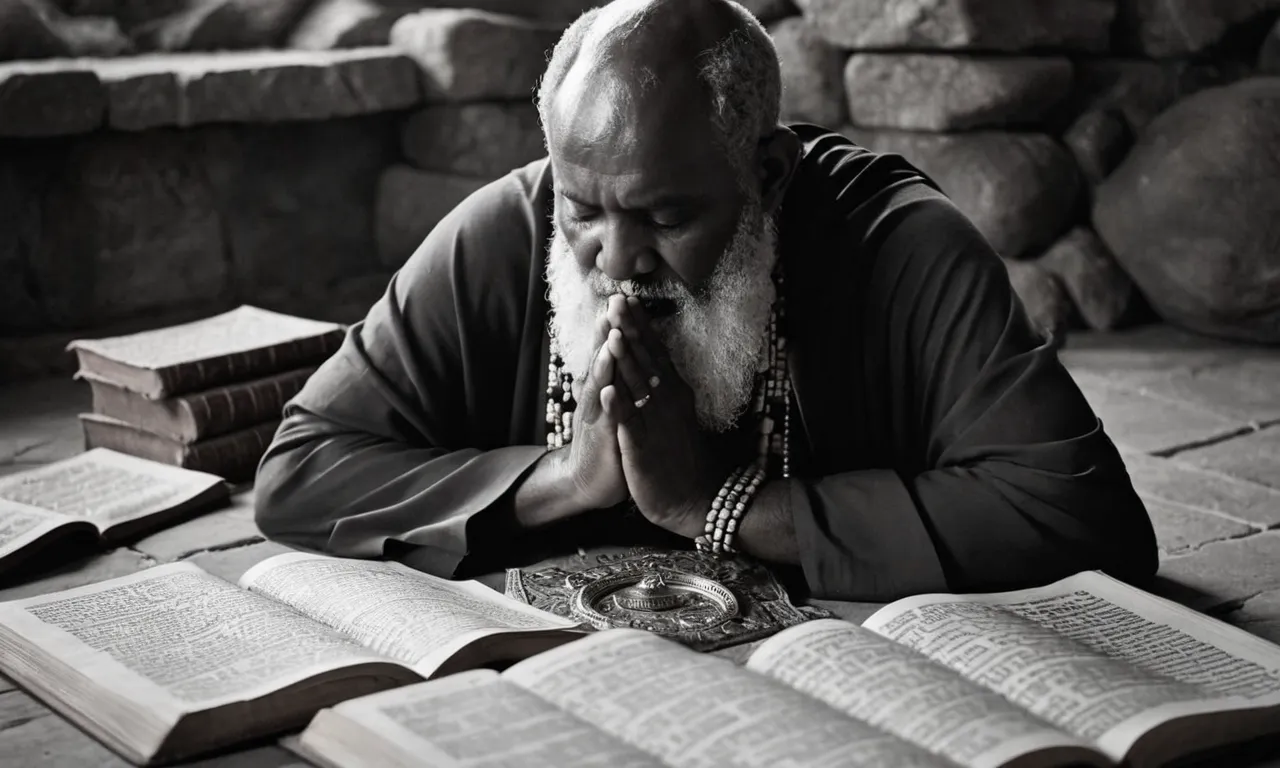Why Did God Choose The Levites?
The Levites occupy a unique position in the Bible as the tribe chosen by God to assist the priests in the temple. Their selection puzzled many then and continues to raise questions now. What made the Levites special? Why did God pick them over the other tribes of Israel?
If you’re short on time, here’s a quick answer: God chose the Levites to serve as His ministers because of their loyalty during the golden calf incident when the other tribes fell into idolatry. Their selection was God’s reward for dedication to Him.
In this article, we will examine the Levites’ background, the key events leading up to their selection, the duties and privileges they were given, the significance of being set apart, and lessons we can learn from this important biblical tribe today.
Background of the Levites
Origin and Early History
The Levites originated from the tribe of Levi, one of the twelve tribes of Israel descended from the twelve sons of Jacob (later named Israel). The Levites earned their special status with God when they rallied around Moses after the incident with the golden calf (Exodus 32).
God was pleased with their loyalty and “set them apart” from the other tribes to be ministers before Him.
In the early history of Israel, the Levites assisted the priests in the worship duties of the tabernacle. They helped transport the tabernacle and its furnishings during the wilderness wanderings. Later, they would carry out secondary services in the temple in Jerusalem.
God assigned the Levites to help the priests as their full-time assistants so they “may do the work of the tent of meeting” (Numbers 1:47-54).
Characteristics and Vocation
The Levites stood out among the twelve tribes in a few key ways. First, they received no allotment of land in Canaan like their fellow tribes. Rather, God decreed “I am your share and your inheritance” (Numbers 18:20).
This special relationship as “the Lord’s chosen ones” (1 Chronicles 15:2) meant the Levites lived among the other tribes but owned no property.
Second, the Levites were set apart for full-time spiritual duties under the supervision of Aaron and his descendents (Exodus 28:1). They served as teachers, judges, gatekeepers, musicians, guardians of the temple treasury, and officers over weights and measures.
Only the Levites could transport the tabernacle and assist the priests with sacrifices and offerings (Numbers 3-4).
Third, the Levites received tithes from the other tribes as payment for their services. As Israel’s religious servants, they relied on the tithes and offerings brought to the Lord’s house (Numbers 18:21-24).
In return, they were to “guard their priesthood” by maintaining the holiness and purity that set them apart (Numbers 18:5-7).
Over time, the Levites became renowned for their musical abilities, wisdom, and leadership. Prominent figures included King David’s choir director Asaph and the prophets Jeremiah and Ezekiel. Jesus’ parable of the Good Samaritan depicted a priest and Levite who failed their duties (Luke 10).
Yet despite periods of corruption, God continually restored this special tribe for service in His house.
| Main Duties | Key Distinctions |
| – Temple assistants to priests | – No tribal allotment of land |
| – Tabernacle transporters | – Set apart for spiritual duties |
| – Teachers & judges | – Supported by tithes |
| – Temple treasury & gates | – High purity standards |
To learn more, check out the articles on the Levites at GotQuestions.org and BibleOdyssey.org.
The Golden Calf Incident
Circumstances Leading Up To It
After the Israelites were freed from slavery in Egypt, Moses went up Mount Sinai to receive the Ten Commandments from God. However, Moses was gone for 40 days, and the Israelites became restless. They approached Aaron, Moses’ brother, and demanded that he make gods for them to worship.
Aaron collected all the gold earrings from the Israelites and constructed a golden calf idol. The people then declared, “These are your gods, Israel, who brought you up out of Egypt!” (Exodus 32:4). Clearly, the Israelites had quickly abandoned the true God who delivered them from bondage and turned to idol worship instead.
Several factors contributed to this devastating turn of events:
- The people were impatient for Moses’ return and gave up hope that he would come back.
- In Moses’ absence, they sought a visible symbol of divine presence to lead and guide them.
- Being surrounded by Egyptian idol worship for centuries influenced their thinking and behavior.
- Aaron unfortunately yielded to the peoples’ demand instead of resisting the pressure.
This tragic incident highlights the tendency of humans to easily forget God’s blessings and turn to false gods out of fear and insecurity. It serves as a sobering lesson on holding fast to faith in God even in difficult situations.
The Levites’ Response
When Moses returned from Mount Sinai with the Ten Commandments and saw the people worshipping the golden calf, he burned with anger. He smashed the stone tablets in outrage over their idolatry. Moses called for action saying, “Whoever is for the Lord, come to me.”
The Levites, from the tribe of Levi, were the only ones who responded. Moses instructed them to strap on their swords and slay the idolaters, “brother, neighbor and kin” who refused to repent (Exodus 32:26-29). The Levites obeyed and killed about 3000 people that day.
The Levites’ willingness to take action for the Lord, even against their own families, distinguished them from the other Israelites. While the crowd easily fell into idolatry, the Levites stayed true to God’s commandments.
Their loyalty and commitment to removing this evil from Israel was instrumental in turning the situation around. It serves as a model of courageous spiritual leadership in the face of great opposition.
Later, God chose the Levites to serve Him in a special capacity. They would assist the priests with Tabernacle duties and be set apart for full-time service to the Lord instead of receiving an allotment of land like the other tribes (Deuteronomy 10:8-9).
The Levites proved themselves faithful in a crucial time of testing.
God’s Reward and Call for the Levites
The Nature of the Reward
The nature of God’s reward for the Levites was that He chose them out from among the Israelites to be set apart for special service to Him (Numbers 3:12). As a reward for their obedience and service, the Lord declared that the Levites would belong to Him (Numbers 3:45).
Part of this selection meant that God commanded the Levites should assist the priests and serve at the tabernacle (Numbers 1:50). In place of receiving a specific allotment of land as their inheritance like the other Israelite tribes, God decreed He himself would be the Levites’ inheritance (Numbers 18:20).
Instructions to Moses Concerning the Levites
The Lord gave Moses specific instructions concerning the Levites and how to organize them. They were to number every male a month old or more and record their names (Numbers 3:15). God provided details on the clans descended from Levi’s three sons, Kohath, Gershon and Merari, including their duties (Numbers 4:4-20).
For example, Kohath’s descendants were responsible for transporting the most sacred articles once the tabernacle was set to journey again (Numbers 4:15). Moses and Aaron also received orders to appoint chief leaders over the Levites to manage the key tasks.
The Consecration of the Levites
Following God’s directions, Moses gathered the whole Israelite community to consecrate the Levites. As the Lord commanded, the Levites laid their hands on designated sacrificial offerings (Numbers 8:10). This act set apart the Levites as belonging to God and prepared them for service.
Then, the Levites were commanded to shave their bodies and wash their clothes as a cleansing ritual. Afterwards, Aaron waved them before the Lord as a special presentation offering to begin their duties (Numbers 8:11).
From then on, Levites 25 years and older engaged in transporting, caring for and guarding the tabernacle.
For more details concerning the Levites, consult the article “Who were the Levites in the Bible?” at GotQuestions.org.
Roles and Privileges of the Levites
Duties in the Tabernacle/Temple
The Levites were entrusted with important responsibilities in the Tabernacle and later the Temple. They assisted the priests in conducting various rituals and sacrifices. The Levites were in charge of assembling, transporting, and disassembling the Tabernacle whenever the Israelites traveled.
They also guarded the Tabernacle from unauthorized access.
In the Temple, the Levites continued to assist the priests in their duties. They provided Temple music, served as gatekeepers, guards, treasurers, singers, and musicians. The Levites ensured the Temple was kept clean and in proper working order.
Their duties show the Levites enjoyed special access and privileges in God’s house that no other Israelite tribe possessed.
Cities and Provisions For Levites
God commanded that the Levites be provided for through tithes and offerings brought by the rest of the Israelites. They were not given land allotments like the other tribes since God said He would be their inheritance (Num 18:20-21).
The Levites lived in 48 cities scattered throughout Israel which gave them wide influence.
The Levites depended on the tithes and offerings brought to the Tabernacle/Temple for their income. God said this was payment for “their service in the tent of meeting” (Num 18:21). Israelites were to present the best tenth of their harvests and flocks to supply the needs of the Levites.
This shows the Levites were privileged to be totally devoted to spiritual duties.
High Priesthood Restricted to Levites
The high priesthood was restricted to Levites of the family of Aaron. The high priest represented the people before God by making atonement for their sins once a year on the Day of Atonement (Lev 16). This was a great privilege and responsibility.
The high priest wore sacred vestments that included the breastplate of judgment with the Urim and Thummim used to determine God’s will (Ex 28:30). He was also responsible for lighting the menorah, burning incense, and replacing the showbread in the Holy Place.
Limiting the high priesthood to Levites shows they were the spiritual leaders of Israel.
Being Set Apart For God’s Service
Meaning and Purpose
The Levites were one of the twelve tribes of Israel, but God selected them to serve Him in the tabernacle in a special way. While all Israelites were called to live holy lives devoted to God, the Levites underwent consecration to dedicate themselves fully to the service of the Lord (Numbers 8:5-26).
As the priests offered sacrifices and made atonement for the Israelites, the Levites assisted them in handling sacred objects, teaching the law, keeping charge over the tabernacle, and carrying out various duties (gotquestions.org).
God intended for the Levites to model wholehearted devotion in His presence and remind the Israelites of the blessing of belonging to Him.
Lessons For Followers of God Today
All believers in Christ are priests who can boldly approach God’s throne of grace (1 Peter 2:9; Hebrews 4:16). Yet we can still learn from the Levites’ example of undivided loyalty and service to the Lord with our time, abilities, and resources.
Setting apart regular times for prayer, Scripture reading, and worship is key to maintaining a close walk with God amid busy routines. We also stir up thankfulness by giving generously to the church and those in need (2 Corinthians 9:6-15).
Overall, Levites teach us to value highly the privilege of knowing and serving the living God.
Conclusion
The Levites’ story carries important lessons about responding to God in faith and wholehearted service. As we have seen, they earned the special status as ministers through their loyalty, obedience and zeal for God’s holiness at a pivotal time when Israel turned to idols.
Like them, we are called as believers to set ourselves apart for God’s purposes. He rewards those who seek Him diligently and stand firm when compromised by spiritual apathy and sin. May the example of the Levites inspire us to ever follow and honor Him.








